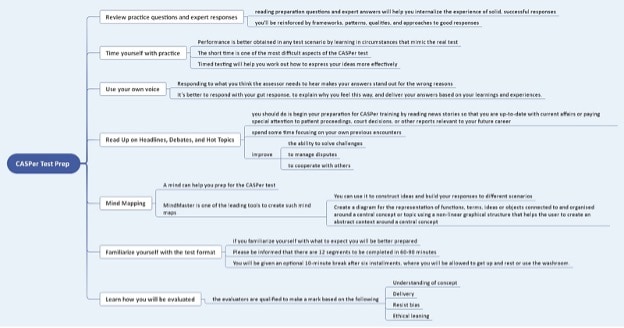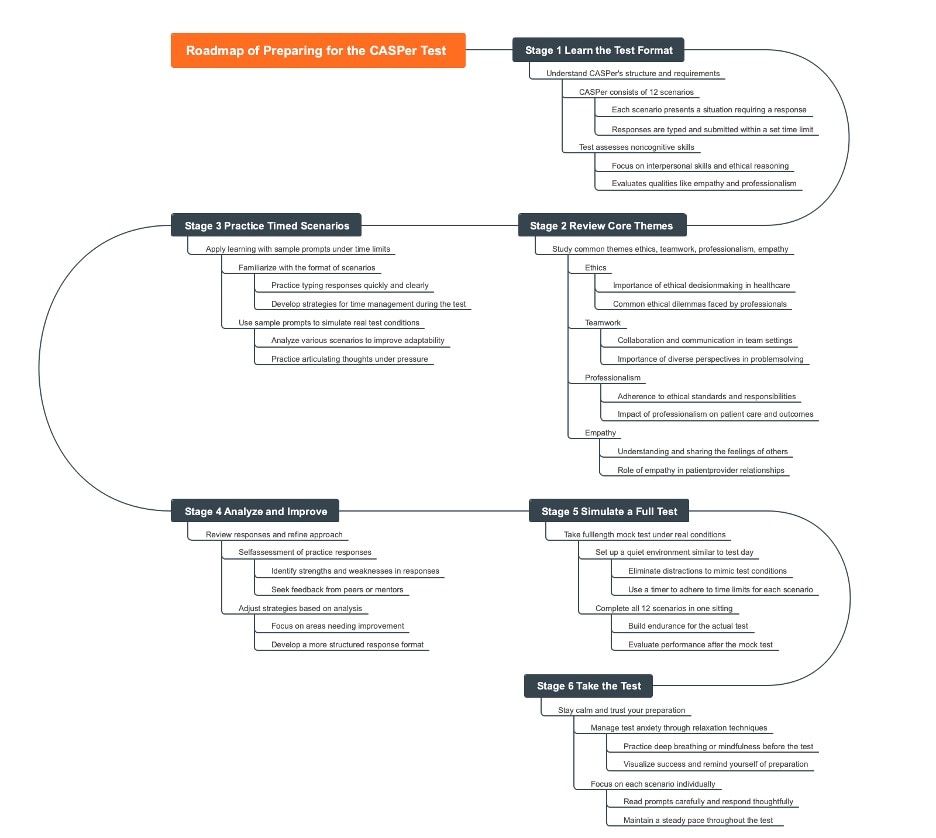This article mainly focuses on the CASPer test, its logistics, and how to prepare for it. Meanwhile, there are several tips to consider when studying the CASPer.
Through this guide, I hope you can learn something or find some inspiration.

In this article
What Is the CASPer Test?
The Computer-based Personal Characteristics Sampling Assessment is an online application produced by McMaster Medical School.
CASPer (Computer-Based Evaluation for the Selection of Personal Characteristics) is an admissions tool developed by McMaster University (Canada) researchers to quantify qualities such as integrity, honesty, empathy, and compassion. You can learn how to study for CASPer.
Medical schools can use it instead of, or in addition to, a conventional medical school interview.
Test creators contend that traditional approaches for assessing the applicant's attributes are inadequate and that CASPer provides a consistent measure of integrity, honesty, and connectivity.
Pretend that you're a medical school admissions service. You know, the typical med school interview (two interviews, one with a professor and the other with a med student) isn't as successful as the MMI.
You can recruit many people to teach them to do an MMI, or you can ask candidates to take an exam that promises to be almost as good as the MMI (though there is a shortage of testing, to put it mildly).
Logistics of the CASPer Test
It is necessary to know all the conditions and standards for taking the CASPer test. The following parts will help you to understand all the logistics of CASPer.

How do I take the CASPer test?
You can take part in the CASPer test via this website: https://takecasper.com/
How much will it cost to take the CASPer?
Requiring candidates to take the exam is a simple choice. The non-refundable examination charge for U.S. candidates is $12, with an additional $12 charge for each med school to which you send the results.
When should you take the CASPer test?
The CASPer test is taken at least once a month, and you can take it online, but you must register three days before the test date.
How long will it take for the CASPer to be scored and sent to medical school?
It will take three weeks for your CASPer test to be scored and sent to the medical school you intend to attend.
How To Prepare for the CASPer Test
There are seven tips for helping students to prepare for the CASPer test. A full preparation may help you release the pressure, segment your prep tasks, and make your knowledge easy to understand.

Review Practice Questions and Expert Responses
No one knows what questions they will answer on the final CASPer exam, so reading preparation questions and expert answers will help you internalize the experience of reliable, successful responses.
Although it's extremely doubtful that you'll get the questions you're looking for on the exam itself, you'll be reinforced by frameworks, patterns, qualities, and approaches to good responses.
You will begin to make specific systems, patterns, qualities, and processes on your own. Note, it is not about memorizing the study material for those questions and answers.
Time Yourself With Practice
Performance is better obtained in any test scenario by learning in circumstances that mimic the real test. The short time is one of the most challenging aspects of the CASPer test.
Timed testing will help you work out how to express your ideas more effectively, and you will be able to respond to the actual exam efficiently.
Practice using practical models, then, and ensure that you receive good feedback on your results. You can learn how to study for CASPer.
Use Your Voice
Responding to what you think the assessor needs to hear makes your answers stand out for the wrong reasons. Many who respond with what they consider to be the "correct" response might sound incorrect or impractical.
Typically, these responses sound inauthentic or are improperly designed because the focus is on displaying a specific function rather than producing a reply.
It's better to respond with your gut response, explain why you feel this way, and deliver your answers based on your learnings and experiences.
Read Up on Headlines, Debates, and Hot Topics
One of the first things you should do is begin your preparation for CASPer training by reading news stories to stay current with affairs.
You can also pay special attention to patient proceedings, court decisions, or other reports relevant to your future career.
Because CASPer is a reflection of your traits, spend some time focusing on your previous encounters and how they have helped you improve such non-cognitive abilities, such as the ability to solve challenges, manage disputes, or cooperate with others.
Use Mind Maps for Visualization and Understanding
A mind map is a simple way to formulate your ideas organically without thinking about order and organization. It helps you organize your thoughts and assists with visual interpretation. A mind can help you prep for the CASPer test.
EdrawMind is one of the leading tools for creating mind maps that help you organize your work and make great timelines that will benefit you in the long run.
You can use it to construct ideas and build your responses to different scenarios. A mind map is a diagram for representing functions, terms, ideas, or objects connected to and organized around a central concept or topic.
It uses a non-linear graphical structure to help the user create an abstract context around this central idea.
Familiarize Yourself With the Test Format
Going into the exam, if you familiarize yourself with what to expect, you will find yourself better prepared. Please know that there are 12 segments to be completed in 60-90 minutes.
You will get an optional 10-minute break after six installments, where you can get up and rest or use the washroom.
The segments consist of either a video-based or a word-based scenario. You are asked to insert your answers to each question in the text box you have described.
When the timer is done, you are immediately guided to the next segment, where a new scenario is introduced.
Learn How You Are Going To Be Evaluated
Here are some of the things CASPer test raters are looking for while analyzing your responses, so you can make sure you know how to plan for CASPer effectively.
In each answer to a question, the evaluators are qualified to make a mark based on the following:
- Understanding of Concepts
How many key ideas do you find in the question?
- Delivery
If you have established and discussed the main pressing issue(s) responsibly and competently.
- Resist Bias
You desire to resist a one-sided answer and to consider different viewpoints.
- Ethical Learning
You will be evaluated based on how you depict strong moral and ethical principles, and whether your commitment to those principles is upheld under pressure.
The DO’s and DON’T’s for Preparation
When preparing for the CASPer Test, you should pay attention to some dos and don'ts, which will be your shortcuts for getting a higher score.
DOs
- Time yourself with practice - Success is more easily achieved in any test scenario by learning in circumstances that mimic the real test. The short time is one of the most stressful aspects of the CASPer test.
- Make statements - Many people respond by describing the characteristics they would like to show in their response or how they think someone else would interpret it. Still, very few consider the language they might use.
- Calm down and breathe - Nothing's going to go smoothly all the time. In some of your reactions, you can expect to make a few mistakes.
DON'Ts
- Don't forget about the little things - Be sure the cap lock is not turned on, don't use slang, and do your best to be grammatically correct with minimum spelling errors.
- Don't leave the response blank only because you don't know how to respond - The assessors know how tough the CASPer test is, but make sure to answer all the questions.
- Don't write your answers directly from the preparation materials.
Roadmap of Preparing for the CASPer Test
To further guide you on your upcoming CASPer test, here’s a sample roadmap you can follow:
This will encompass everything from building awareness about the test to reflections and decision-making as you go through your exams. It can be a scary test to take, but it doesn’t have to be.
All you need is the right guidance for preparation.
- Stage 1: Learn the Test Format
Begin by understanding CASPer’s structure. It presents video or text scenarios, each followed by timed questions. Familiarize yourself with the number of sections, time limits, and response requirements.
- Stage 2: Review Core Themes
Move on to studying common themes such as ethics, teamwork, professionalism, and empathy. Read case examples from healthcare, education, or workplace settings. This stage builds the foundation for sound judgment.
- Stage 3: Practice Timed Scenarios
Start applying what you learned. Use sample CASPer-style prompts and answer under strict time limits. Focus on clarity and structure in both written and video responses.
- Stage 4: Analyze and Improve
After each practice, review your responses. Identify gaps in reasoning, vague statements, or missed perspectives. Adjust your approach and refine your answers for better precision.
- Stage 5: Simulate a Full Test
In this final stage of preparation, make sure to take a full-length mock test under real conditions. This step builds stamina, ensures you can manage the time pressure, and confirms readiness for the actual exam.
- Stage 6: Take the Test
It’s D-Day! Remember that all your preparation led up to this. Don’t let it go to waste and stay calm. A calm mind is bound to give better answers. Trust yourself and how you’ve prepared – you’ve got this. Good luck!
Recommended Resources for the CASPer Test
In addition, here are some recommended resources that you can rely on as you prepare for the CASPer test. But reviewing your materials will still be the best way to prepare for it. A consistent schedule is the key.
For Guides
Start with official guides from Acuity Insights, the makers of CASPer. These explain the structure, scoring, and expectations directly from the source.
Free online blogs, like those from BeMo Academic Consulting, also offer step-by-step breakdowns of what to expect.
For Practice Tests
Several platforms provide timed CASPer practice scenarios. BeMo and PrepMatch are widely recommended by past test-takers. They include both text and video scenarios with feedback options.
Free sample questions are also available on Reddit communities and pre-med forums where students share mock prompts.
How To Boost Efficiency With a Mind Map
A mind map can transform CASPer preparation into a more organized and effective process. Instead of juggling scattered notes or case examples, a mind map helps you see the bigger picture.
You can group ethical principles, common scenarios, and response strategies into branches. This visual layout makes it easier to recall information under time pressure, which is essential for CASPer’s fast-paced format.
How To Create a CASPer Test Mind Map Reviewer
To create one, begin with “CASPer Test” at the center. Add main branches such as Ethical Principles, Professional Scenarios, Personal Examples, and Practice Strategies.
Each branch can then break down further—for instance, Ethical Principles could include autonomy, beneficence, and fairness, each with real-world examples.
Over time, this structure serves as a quick-reference guide for both practice and review.
Use a Mind-Mapping Tool: Wondershare EdrawMind
For building digital maps, there are many free tools available. Wondershare EdrawMind is a simple knowledge management platform for mind maps. With it, you can rearrange branches, add notes, or attach examples as you refine your preparation.
D-Day Tips for the CASPer Test
Unlike other exams, CASPer isn’t actually about the right answer. It’s about your analysis skills and presentation of ideas that gives you a good score overall.
Above, we covered general tips for study prep. Here, let’s check out some known strategies or answering methods that will help you get a good score in the CASPer test:
- Use a simple framework. Since CASPer is an exam that rewards reasoning, use a uniform framework for the situations or questions. This can be: 1) Acknowledge the issue; then 2) Analyze the perspectives involved; then 3) Act by explaining what you’d do and why.
- Don’t chase perfection. Of course, it’s good to give categorical answers. But if you’re unsure, you can use appeals to empathy (“I’d listen to their concerns”) or use reflection (“I’d gather more information”).
- Don’t write too long. The scenario is that your examiner will be checking a lot of CASPer exam answers. So, make yours stand out by keeping it short yet sweet. Quality over quantity.
- Default to core values. Fairness, honesty, respect, and accountability are always safe principles to rely on if you’re unsure which perspective should be applied.
- General video response tip. For video responses, maintain steady eye contact with the camera. Speak calmly, using pauses to sound thoughtful. If stuck, restate the dilemma and start reasoning: “This is a challenging situation, but I’d begin by…”
Conclusion
According to this article, it is useful for preparing for the CASPer test. As is known, the CASPer test is an essential test for medical students in the US.
Only by mastering a valuable and efficient method will you stand out and achieve a higher score to get into your dream medical school.
It is practical to use mind maps for understanding and remembering knowledge and ideas through various methods. EdrawMind is a powerful and accessible mind mapping software.
You can create detailed and intuitive mind maps with only a few clicks. With mind maps, the complicated concepts could be simplified into a few images.
FAQs
Lastly, here are some FAQs that you might appreciate as you prepare for the CASPer test. Good luck!
-
1. What’s the best way to structure my CASPer responses?
Use a simple formula like: empathize, analyze both sides, propose solutions, then justify your choice. Some test-takers add “if/then” logic to show flexibility.
For example: “If the scenario changes, then I would adjust my response.”
-
2. How many practice scenarios should I do before the test?
Do as many as you can. But quality matters more than quantity. One user recommends watching model answers first, then doing timed prompts and comparing responses.
Start with free official ones and then move to peer platforms like PrepMatch for feedback.
-
3. How do I know what level of detail to include in my answers?
Include enough context to show you understood the situation, but avoid long stories. For personal questions, narrate what you did, why you did it, and what you learned.
Also, prioritize clarity over length: judges score content, not grammar or your word count.
-
4. Should I bring personal experiences into CASPer responses?
Yes, selectively. If an experience fits well, it can show authenticity and insight. But avoid forcing stories—make sure they’re relevant, concise, and support your reasoning.
-
5. How do I improve my typing speed and video performance for CASPer?
Practice typing regularly. Tools like TypeRacer help improve words per minute (WPM). For video responses, record yourself answering sample scenarios, watch your posture, pace, and clarity, then refine accordingly.







